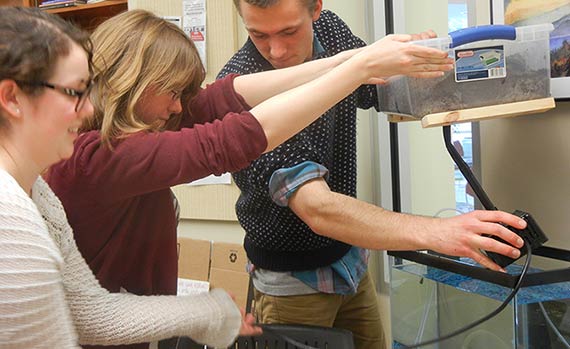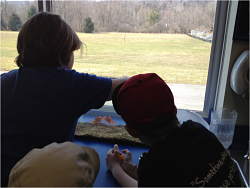
Written by Jessica Halter ’13
Green Thumbs and Good Food Forum teamed up to learn about a revolutionary food production system. The method is not new though. It was used by the Aztec when they did fish farming in lakes with floating islands where they produced crops. Aquaponics is a zero-waste closed-loop food production system. Commercially, it combines two systems – hydroponics and aquaculture to get the best of both methods.
Aquaponics involves growing fish in a tank. The fish water filled with fish waste (fertilizer) is cycled to a tank that grows lettuce. In that tank, the fish waste feeds beneficial microbes and bacteria that fertilize the lettuce and help it grow quickly. The lettuce acts as a filter that cleans out the water that is then cycled back to the fish tank. Many other produce including strawberries and tomatoes can be grown aquaponically. Aquaponics is an easily was to produce protein and vegetables or fruits in one system in a low light environment over the winter.
Members of both student clubs visited Main Street Farms, an aquaponics farm in Cortland, NY last winter. They were inspired by the visit and decided to build a similar mini-aquaponics system to what they saw at the farm. It involved growing goldfish in a tank and placing a grow bed to grow a few plants above it.
 They designed their system and held a workshop where 15 students tested, and proto-typed the mini aquaponics system. After making a few modifications to the soil and the water flow system, they found the perfect system. The materials for a second system were assembled and they lead a 1 hour science class in Mr. Latella’s 5th Grade Classroom at Hamilton Central School. They taught the students about the science behind the system and the kids marveled at having an exciting project live in their classroom.
They designed their system and held a workshop where 15 students tested, and proto-typed the mini aquaponics system. After making a few modifications to the soil and the water flow system, they found the perfect system. The materials for a second system were assembled and they lead a 1 hour science class in Mr. Latella’s 5th Grade Classroom at Hamilton Central School. They taught the students about the science behind the system and the kids marveled at having an exciting project live in their classroom.
The aquaponics project allowed Colgate students and Hamilton Central School students to learn about this food production system that is revolutionizing where fish and lettuce can be grown and is creating a year-long growing season for local food.

